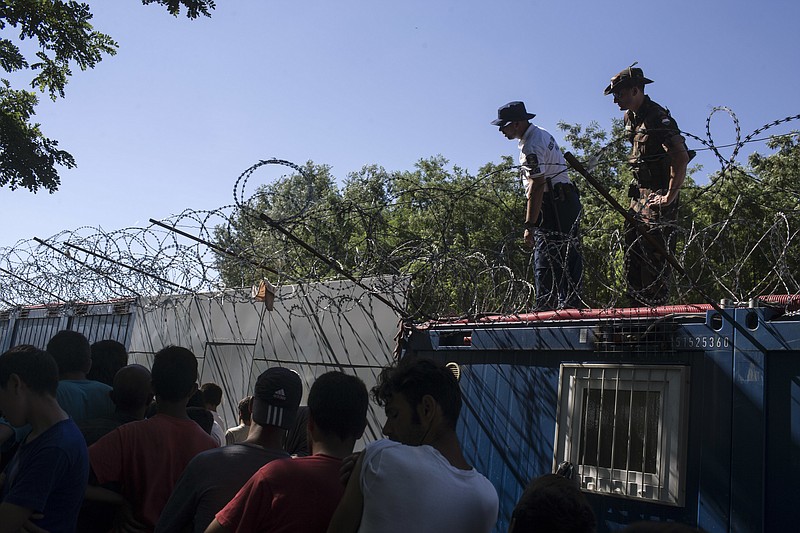BUDAPEST, Hungary (AP) - Hungarian police and soldiers have severely beaten some migrants before sending them back across the border to Serbia, Human Rights Watch said Wednesday - a report that was disputed by the Hungarian government.
Since July 5, migrants caught within 8 kilometers (5 miles) of the Hungarian border are being returned to the Serbian side of the razor-wire fence built by Hungary last year to stem the migrant flow. Police said 621 people were sent back to Serbia since the new rules took effect.
One of the claims of abuse noted in the HRW report said men in a group of 30-40 migrants that also included women and children were beaten by soldiers for two hours after being detained in Hungary.
"I haven't even seen such beating in the movies," the reported quoted an unidentified man as saying. "Five or six soldiers took us one by one to beat us. They tied our hands with plastic handcuffs on our backs. They beat us with everything, with fists, kicks, and batons. They deliberately gave us bad injuries."
Others interviewed by HRW said they were beaten by police and injured when forced back into Serbia through small openings in the razor-wire fence.
Migrants interviewed Wednesday by The Associated Press in Horgos, Serbia, near one of the Hungarian transit zones, described similar treatment by Hungarian officers.
"I went to Hungary three times. It is very difficult, they beat me up," said Wahed Khan, a 24-year-old migrant from Afghanistan. "Hungarian police are beating people. They injured many people by spraying (tear gas), they use a very dangerous sort of spray."
The HRW report was based on interviews with 41 asylum-seekers and migrants as well as officials from a wide range of institutions, including the U.N. refugee agency, Hungarian police and the immigration office.
The organization said Hungary was also failing to comply with international standards regarding asylum-seekers, for example by quickly dismissing most asylum claims from single men, while accepting only 15 claims daily at each of the two transit zones on the Serbian border. This has led to hundreds of refugees being stranded at the border in precarious conditions.
"The abuse of asylum seekers and migrants runs counter to Hungary's obligations under EU law, refugee law, and human rights law," said Lydia Gall, the rights group's regional researcher. "The European Commission should use its enforcement powers to press Budapest to comply with its obligation under EU law to provide meaningful access to asylum and fair procedures for those at its borders and on its territory."
"Hungary is breaking all the rules for asylum-seekers," Gall said.
The Interior Ministry, in charge of border protection with assistance from the army, rejected the HRW report.
"Migrants are not harassed on the Hungarian border. Hungary treats those truly in need humanely," the ministry said in a statement. "At the same time, it expects migrants to obey to laws of the European Union and Hungary."
The ministry said this year only eight migrants out of nearly 18,000 had filed complaints about police mistreatment but internal reviews found all the claims to be baseless. To rule out the possibility of partiality, the reviews were forwarded to prosecutors.
HRW also said Hungary was applying "legal fiction" at the border transit zones, as people there were not considered to have entered the country even though the zones are in Hungary. This makes it possible for Hungary to ensure that refugees whose asylum claims are rejected in the transit zones do not try to stay in Hungary or pass through the country, as nearly 400,000 people did last year, on their way west.
___
Marko Drobnjakovic in Horgos, Serbia, contributed to this report.
